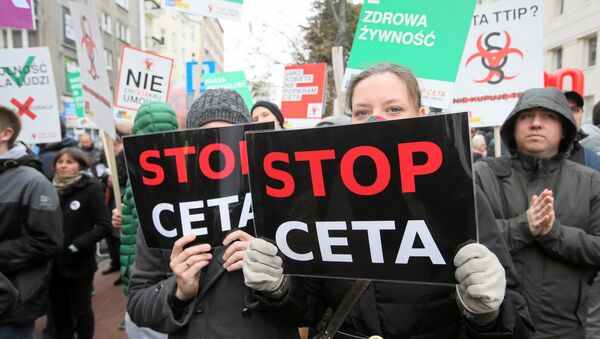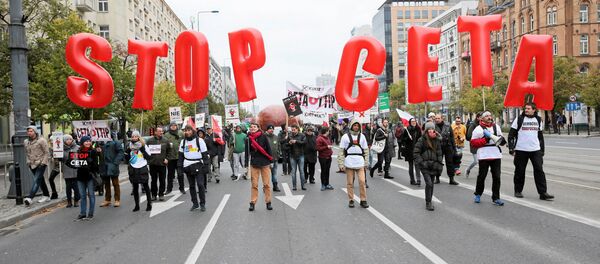With EU heads of state meeting on Thursday and Friday (October 20-21) to try and salvage the deal by this week's deadline, increased attention will turn to Romania, Bulgaria and the Belgian region of Wallonia, as they continue to veto CETA.
Romania and Bulgaria provided the EU with a fresh headache on Tuesday (October 18), with government officials calling for written assurances from Canada over the issue of visa-free travel, indicating they would not support the deal otherwise.
no #EU signature for #CETA today because of Belgium & visa issues Bulgaria and Romania, says presidency representative at press conference
— Wybe Douma (@WybeDouma) October 18, 2016
Currently, Romania and Bulgaria are the only EU countries without a visa-free travel agreement with Canada.
While the two countries are supportive of the CETA deal, officials in Bucharest and Sofia have used negotiations to try and sort out their visa dispute with Ottawa.
The Wallonia Problem
Despite the visa concerns of the eastern European states, the EU's main obstacle to passing the CETA appears to be in the form of the Belgian region of Wallonia, with the region's Minister-President saying he would not support the deal by the EU's self-imposed deadline of Friday.
"There are still too many problems to strike an agreement by Friday," Paul Magnette told a Walloon parliament meeting on October 18.
Wallonia not alone on #CETA! Hope that other Belgian regions, Austria, Slovenia, Bulgaria, Romania & Luxembourg may not sign @janycemcgregor
— Brent Patterson (@CBrentPatterson) October 17, 2016
"The democratic process must go the distance, right to the end," he said.
While Belgium's federal government supports the deal, the EU cannot sign off on CETA unless there is unanimous support from all member states and regions, including Wallonia.
Does #EU delay mean #CETA might fail? Probably not. #Bulgaria, #Romania and #Belgium likely will consent if given €/promises in return.
— Maximilian Hofmann (@maxhofmann) October 18, 2016
The French-speaking region has raised serious concerns over the contents of the CETA deal, citing impacts on public service workers and agricultural industries.
While proponents say the deal will encourage more investment and trade with Canadian companies, critics argue the deal will have an adverse impact on workers' rights and grant unprecedented powers to big businesses.
EU Facing 'Credibility Test'
The EU's difficulty in gathering support for the deal has also led to concerns that next week's planned summit (October 27), whereby Canadian Prime Minister Justin Trudeau was expected to travel to Brussels and sign off on the deal, may be canceled.
While some officials maintain that the ultimate deadline to strike a deal is October 27, the EU Trade Commissioner Cecilia Malmstrom said an agreement between member states needs to be in place by Friday, if next week's summit is to go ahead as planned.
#CETA — no agreement yet. Belgians still holding out. Cecilia Malmstrom: "Talks are intense and they continue."
— Soumaya Keynes (@SoumayaKeynes) October 18, 2016
"There has to be an agreement [this week]" she said, arguing that if CETA wasn't unanimously supported, then "there will not be a summit."
Malmstrom also addressed the issue of how the EU conducts trade deals, saying the bloc was facing questions about its trade "credibility."
'If we can't make it with Canada I don't think we can make it with UK' says EU Trade Comm @MalmstromEU about CETA deal held up by Wallonia
— Danny Kemp (@dannyctkemp) October 18, 2016
"There are of course bigger things at stake than only this agreement," she said.
"It's about the credibility of the European Union to conclude trade agreements in the future."
Talks between European leaders will continue October 20-21.



